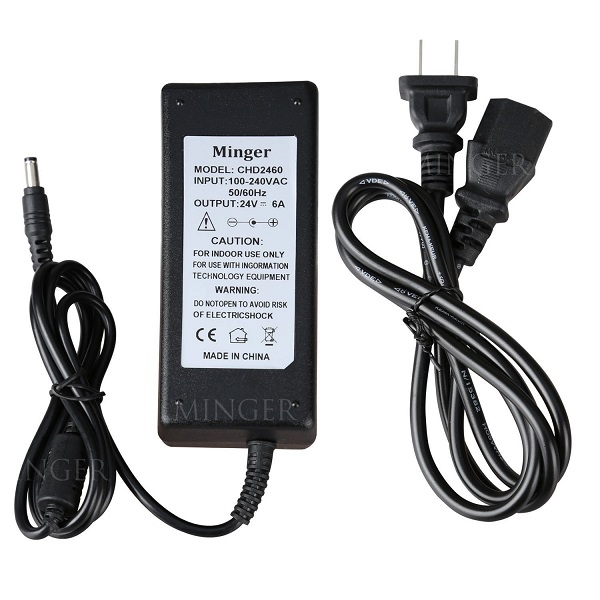Page 1 of 1
Power supply options
Posted: Wed Sep 14, 2016 3:54 pm
by dmwahl
Has anyone used a laptop style brick power supply instead of the open chassis type like meanwell? I'd like to avoid exposed AC wiring and then having to build a cover for it, so I'm looking at something like this:
https://www.amazon.com/dp/B01AJQ9G2C
Rated at 24V/6A, which ought to be perfect if the rating is not too optimistic. If anyone else has used a similar power supply I'd be interested to hear about it. I plan on mounting the power supply, boards, and wiring to an aluminum plate so it will get a marginal amount of cooling that way, but I'm not planning on forced air unless I need to.

- 24v-brick.jpg (83.9 KiB) Viewed 9686 times
Re: Power supply options
Posted: Wed Sep 14, 2016 5:06 pm
by mrandt
I think for the steppers that should be sufficient and I think for the price at which notebook power supplies sell, you can't do much wrong.
If you decide to upgrade to a different vacuum pump, you may need to power that seperately.
Re: Power supply options
Posted: Wed Sep 14, 2016 7:57 pm
by dmwahl
I am planning on a different vacuum pump, I have some samples of high reliability quiet medical pumps at work rated up to about 24inHg. Priority one will be to get it running, after that I'll look at improvements. I have an electronic load to test out that power supply before hooking it up the machine, I'll post results here.
Re: Power supply options
Posted: Thu Sep 15, 2016 3:49 pm
by dmwahl
Scratch that brick power supply. One of the reviewers tested their supply with a programmable load and found it collapsed around 4.5A, which isn't a huge surprise given how cheap chinese stuff gets spec'd. Ended up ordering a Meanwell LRS-150-24 and will just make a cover for it. No sense cheaping out on the power supply when the rest cost a fair bit more.
Re: Power supply options
Posted: Mon Oct 10, 2016 4:47 am
by johnswenson1
I wound up getting a Mean Well GST220A24-R7B.
It is a fully sealed table top supply with a standard 3pin IEC AC main inlet and attached cable with a 4 pin DIN connector. It is rated for 9.2A at 24V. I haven't fully tested it yet, But I HAVE tested several other GST series supplies and found the rating to be slightly conservative. So when it says 9.2A it probably really is 9.2A at 24V continuous.
This is not small, it is a BIG table top supply, but that means it has enough surface area to dissipate any heat nicely. Others in the series barely get warm at their full rated capacity.
The DIN connector is only rated for 7.5A per pin, but it uses 2 pins for V- and two pins for V+.
I think it is probably going to be an ideal supply for the LitePlacer.
I got mine on Amazon. There are many distributors around the world. Cost was US $73.
John S.
Re: Power supply options
Posted: Mon Oct 10, 2016 10:42 pm
by dmwahl
I wonder if anyone has actually measured current consumption? I plan on wiring mine such that I can put an inline meter between the 24V supply and the tinyg.
Re: Power supply options
Posted: Wed Nov 23, 2016 11:31 pm
by WayOutWest
dmwahl wrote:Scratch that brick power supply. One of the reviewers tested their supply with a programmable load and found it collapsed around 4.5A, which isn't a huge surprise given how cheap chinese stuff gets spec'd. Ended up ordering a Meanwell LRS-150-24 and will just make a cover for it. No sense cheaping out on the power supply when the rest cost a fair bit more.
Wise move.
If you're really desperate to get a cheap 24V power supply and have more time than money the best choice is to wire two ATX (i.e. desktop computer) power supplies in series -- connect DC+12v from one to DC+0V (DC ground) on the other. You MUST make sure the AC grounds remain connected to each other and the mains ground pin (for safety) and you also MUST make sure that the high-side power supply's DC+0V is NOT connected to AC ground (use a multimeter to check, may require disconnecting the supply chassis from DC ground) otherwise it'll just short itself out.
But it's really more work to do (safely) than the cost of a meanwell. On the other hand if you need something like 200 amps of +24v then doing this with a pair of server PSUs is by far the most economical option.